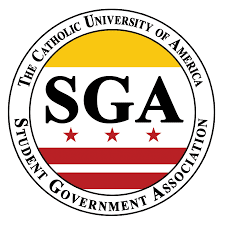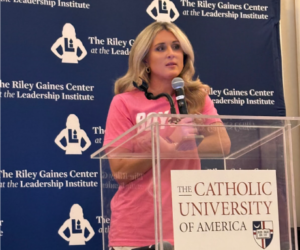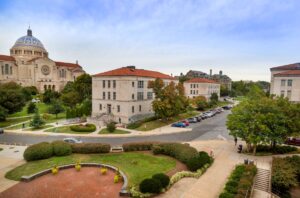SGA, During one of the Longest Sessions of the School Year, Passes Three New Pieces of Legislation

By Katie Hoban
The Student Government Association (SGA) of Catholic University held a senate session 5-8 in which the senate debated a piece of legislation to add a water filtration system in Gibbons Hall and a bill to make freshman learning community (LC) classes more structured regarding assessment. The senate also opened the floor for discussion on resolutions to implement a new university portal system and to create a food service employee of the month program. The meeting took place on Monday, February 10 in the Pryzbyla Center Great Room.
Following opening remarks, the senate moved to confirm two senate nominees. Senior Marie Kottenstette of the Rome School of Theater and freshman Dominic Decker of the class of 2023 were approved unanimously and senator Kottenstette and Decker were able to participate in the referendum.
After the inductions, senator Maura Schlee brought Resolution 013, regarding the matter of filtered water in Gibbons Hall, to the floor for debate. This building that houses 138 upperclass students each year, does not have any water fountains.
Senator Cavan Hagerty drew some concern during the proposal, stating that Gibbons Hall is one of the oldest residency halls on campus and the building of a water system could bring health hazards such as asbestos. Hagerty also questioned the feasibility of enacting a water system, and if the school had the means to do so.
Schlee responded that she has the support of Housing Services, a department on campus that has been trying to update the water systems in all residence halls, including Ryan and Regan which should have new water fountains in the Spring of 2020. She also noted that even a water station, such as those in offices, would suffice for the residents in the building. A resolution to amend the name of the resolution to “Add a Filtered Water Station to Gibbons Residence Hall,” passed under a voice vote, rather than going senator by senator. Resolution 013 passed unanimously.
The next topic of discussion was Resolution 014, brought to the floor by senator Juliana Fitzsimmons. This resolution “requests that the Undergraduate Studies office implements a set of guidelines which has the same curriculum and assessment standards for all Learning Communities,” in order to bring more structure to the LC’s. This ended up being the most contentious debate of the night, lasting approximately two hours.
Fitzsimmons stated that learning communities, required to be taken by the freshman class, did not follow a curriculum, and as a result there is no standard course material.
Senator Hagerty stated that he liked the idea that students would have a baseline of material, but questioned where the guidance for those materials would come from. Senator Cecelia Bracey asked a similar question, asking where the standards for the courses would come from
Senator Melissa Zentz, a co-sponsor of the bill, responded that the standards will be different due to subject and that there will be no set requirements for those classes.
Further on into debate, senator Christopher Carey was called on to state his concerns. Carey said that he “had a complex issues with this resolution” because “an important aspect of the first year experience, is just that, an experience.” He argued that the different atmospheres of each LC is what brought those in class together due to its “unique experience.”
Fitzsimmons expressed disappointment with Carey’s remark, as she wished he had brought these concerns up during their Academic Affairs Committee meeting, before being brought to the floor. Following this comment, senator Matthew Toppi suggested bringing the resolution back to committee to be revised.
After lengthy debate, Resolution 014 passed 13-11, with newly inducted Decker being the deciding vote.
Resolution 015, regarding a new university portal system, and resolution 016, to create a food service employee of the month, were also brought to the floor.
Resolution 015 was introduced by Zentz, stating that the Cardinal Station, a navigation device used by students to track their academic records, is “unfriendly” and “difficult to navigate” on various mobile devices. Zentz’s main speaking point was Cardinal Pay, which tracks students’ balance on their cardinal cards, “does not give direct notifications” to students regarding their statements for the semester.
Her new proposal calls for the scraping of Cardinal Station and to support Enrollment Services “in implementing a new portal system.” With little debate, the resolution passed in the senate.
The last topic of discussion was Resolution 016, regarding the implementation of a food service employee of the month program. This was brought to the floor by Schlee, her second resolution of the night. She stated that the “relationship between students and food service staff on campus could be improved.” This resolution failed to pass.
Decorum problems began to arise after a much heated debate, with senator Gerald Sharpe standing to be called on while the sponsor of resolution 014 was speaking, grammar mistakes within resolutions presented, and improper speech by senator Joseph Galassi. The next SGA Meeting will be held on Monday, February 24.







